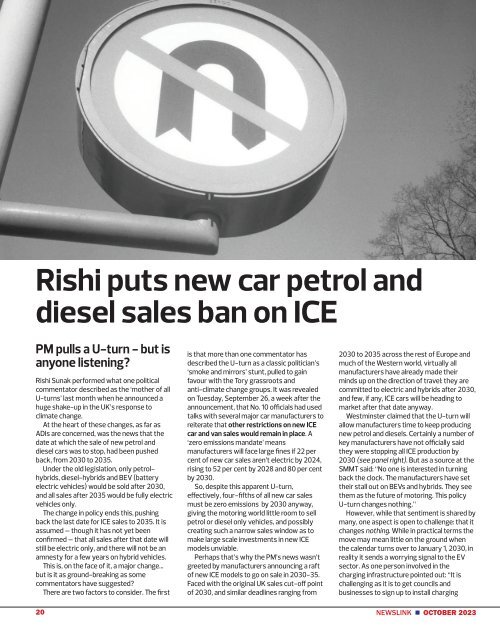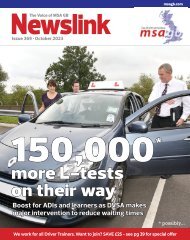Newslink October Marketing Special
Marketing issue of Newslink October, Motor Schools Association, driver training and testing, road safety
Marketing issue of Newslink October, Motor Schools Association, driver training and testing, road safety
You also want an ePaper? Increase the reach of your titles
YUMPU automatically turns print PDFs into web optimized ePapers that Google loves.
News<br />
Rishi puts new car petrol and<br />
diesel sales ban on ICE<br />
PM pulls a U-turn - but is<br />
anyone listening?<br />
Rishi Sunak performed what one political<br />
commentator described as the ‘mother of all<br />
U-turns’ last month when he announced a<br />
huge shake-up in the UK’s response to<br />
climate change.<br />
At the heart of these changes, as far as<br />
ADIs are concerned, was the news that the<br />
date at which the sale of new petrol and<br />
diesel cars was to stop, had been pushed<br />
back, from 2030 to 2035.<br />
Under the old legislation, only petrolhybrids,<br />
diesel-hybrids and BEV (battery<br />
electric vehicles) would be sold after 2030,<br />
and all sales after 2035 would be fully electric<br />
vehicles only.<br />
The change in policy ends this, pushing<br />
back the last date for ICE sales to 2035. It is<br />
assumed – though it has not yet been<br />
confirmed – that all sales after that date will<br />
still be electric only, and there will not be an<br />
amnesty for a few years on hybrid vehicles.<br />
This is, on the face of it, a major change...<br />
but is it as ground-breaking as some<br />
commentators have suggested?<br />
There are two factors to consider. The first<br />
is that more than one commentator has<br />
described the U-turn as a classic politician’s<br />
‘smoke and mirrors’ stunt, pulled to gain<br />
favour with the Tory grassroots and<br />
anti-climate change groups. It was revealed<br />
on Tuesday, September 26, a week after the<br />
announcement, that No. 10 officials had used<br />
talks with several major car manufacturers to<br />
reiterate that other restrictions on new ICE<br />
car and van sales would remain in place. A<br />
‘zero emissions mandate’ means<br />
manufacturers will face large fines if 22 per<br />
cent of new car sales aren’t electric by 2024,<br />
rising to 52 per cent by 2028 and 80 per cent<br />
by 2030.<br />
So, despite this apparent U-turn,<br />
effectively, four-fifths of all new car sales<br />
must be zero emissions by 2030 anyway,<br />
giving the motoring world little room to sell<br />
petrol or diesel only vehicles, and possibly<br />
creating such a narrow sales window as to<br />
make large scale investments in new ICE<br />
models unviable.<br />
Perhaps that’s why the PM’s news wasn’t<br />
greeted by manufacturers announcing a raft<br />
of new ICE models to go on sale in 2030-35.<br />
Faced with the original UK sales cut-off point<br />
of 2030, and similar deadlines ranging from<br />
2030 to 2035 across the rest of Europe and<br />
much of the Western world, virtually all<br />
manufacturers have already made their<br />
minds up on the direction of travel: they are<br />
committed to electric and hybrids after 2030,<br />
and few, if any, ICE cars will be heading to<br />
market after that date anyway.<br />
Westminster claimed that the U-turn will<br />
allow manufacturers time to keep producing<br />
new petrol and diesels. Certainly a number of<br />
key manufacturers have not officially said<br />
they were stopping all ICE production by<br />
2030 (see panel right). But as a source at the<br />
SMMT said: “No one is interested in turning<br />
back the clock. The manufacturers have set<br />
their stall out on BEVs and hybrids. They see<br />
them as the future of motoring. This policy<br />
U-turn changes nothing.”<br />
However, while that sentiment is shared by<br />
many, one aspect is open to challenge: that it<br />
changes nothing. While in practical terms the<br />
move may mean little on the ground when<br />
the calendar turns over to January 1, 2030, in<br />
reality it sends a worrying signal to the EV<br />
sector. As one person involved in the<br />
charging infrastructure pointed out: “It is<br />
challenging as it is to get councils and<br />
businesses to sign up to install charging<br />
20 NEWSLINK n OCTOBER 2023
















